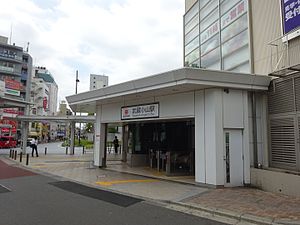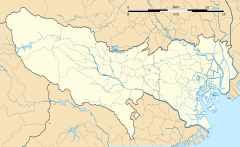Musashi-koyama Station
Appearance
MG03 Musashi-koyama Station 武蔵小山駅 | ||||||||||||||||
|---|---|---|---|---|---|---|---|---|---|---|---|---|---|---|---|---|
 The east entrance in August 2016 | ||||||||||||||||
| General information | ||||||||||||||||
| Location | 3-4-8 Koyama, Shinagawa, Tokyo Japan | |||||||||||||||
| Operated by | ||||||||||||||||
| Line(s) | ||||||||||||||||
| Distance | 2.6 km (1.6 mi) from Meguro | |||||||||||||||
| Platforms | 2 island platforms | |||||||||||||||
| Tracks | 4 | |||||||||||||||
| Construction | ||||||||||||||||
| Structure type | Underground | |||||||||||||||
| Other information | ||||||||||||||||
| Station code | MG03 | |||||||||||||||
| Website | Official website | |||||||||||||||
| History | ||||||||||||||||
| Opened | 11 March 1923 | |||||||||||||||
| Rebuilt | 2 July 2006 | |||||||||||||||
| Previous names | Koyama (until June 1924) | |||||||||||||||
| Passengers | ||||||||||||||||
| FY2018 | 53,952 daily[1] | |||||||||||||||
| Services | ||||||||||||||||
| ||||||||||||||||
| ||||||||||||||||
Musashi-koyama Station (武蔵小山駅, Musashi-koyama-eki) is a railway station on the Tokyu Meguro Line in Shinagawa, Tokyo, Japan, operated by the private railway operator Tokyu Corporation.
Lines
Musashi-koyama Station is served by the Tokyu Meguro Line, and lies 2.6 km from the starting point of the line at Meguro.[2]
Station layout
This station has two island platforms serving four tracks. Local trains typically use tracks 1 and 4, while express trains use tracks 2 and 3.
Platforms
| 1/2 | MG Tokyu Meguro Line | for Ōokayama, Den-en-chōfu, Musashi-Kosugi, and Hiyoshi SH Tōkyū Shin-yokohama Line for Shin-Yokohama |
| 3/4 | MG Tokyu Meguro Line | for Meguro N Tokyo Metro Namboku Line for Akabane-Iwabuchi SR Saitama Rapid Railway Line for Urawa-Misono I Toei Mita Line for Nishi-takashimadaira |
History
The station opened on 11 March 1923, initially named simply Koyama Station (小山駅).[2] It was renamed Musashi-koyama in June 1924.[2]
The station was rebuilt as an underground station, reopening on 2 July 2006.[2]
Passenger statistics
| Year | Ridership |
|---|---|
| 2010 | 46,733[3] |
| 2011 | 47,425[4] |
| 2012 | 48,848[5] |
| 2013 | 50,999[6] |
| 2014 | 51,337[7] |
| 2015 | 52,142[8] |
| 2016 | 52,369[9] |
| 2017 | 53,186[10] |
| 2018 | 53,952[1] |
Surrounding area
See also
References
- ^ a b "TOKYU CORPORATION 2019-2020". Retrieved 18 Mar 2020.
- ^ a b c d Terada, Hirokazu (19 January 2013). データブック日本の私鉄 [Databook: Japan's Private Railways]. Japan: Neko Publishing. p. 230. ISBN 978-4-7770-1336-4.
- ^ "TOKYU CORPORATION 2011-2012". www.tokyu.co.jp. Retrieved 2020-03-18.
- ^ "TOKYU CORPORATION 2012-2013". www.tokyu.co.jp. Retrieved 2020-03-18.
- ^ "TOKYU CORPORATION 2013-2014". www.tokyu.co.jp. Retrieved 2020-03-18.
- ^ "TOKYU CORPORATION 2014-2015". www.tokyu.co.jp. Retrieved 2020-03-18.
- ^ "TOKYU CORPORATION 2015-2016". www.tokyu.co.jp. Retrieved 2020-03-18.
- ^ "TOKYU CORPORATION 2016-2017". www.tokyu.co.jp. Retrieved 2020-03-18.
- ^ "TOKYU CORPORATION 2017-2018". www.tokyu.co.jp. Retrieved 2020-03-18.
- ^ "TOKYU CORPORATION 2018-2019". www.tokyu.co.jp. Retrieved 2020-03-18.
External links
Wikimedia Commons has media related to Musashi-Koyama Station.
- Official website (in Japanese).




